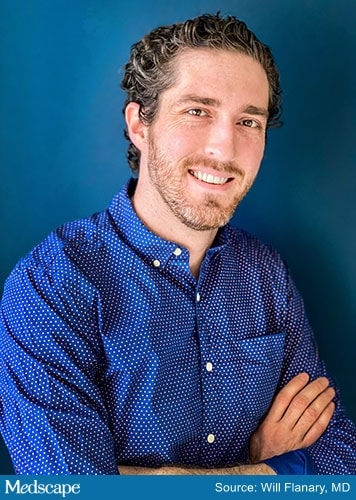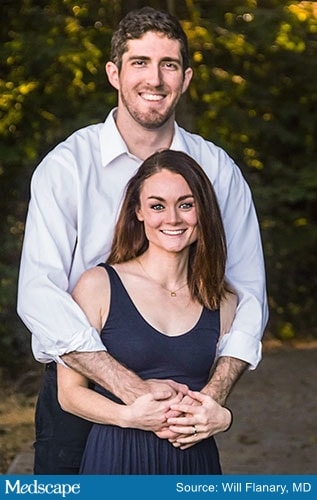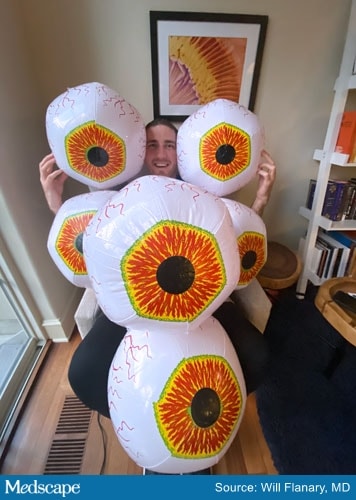Will Flanary, MD, is not a typical ophthalmologist. By day, the 35-year-old cares for the eyeballs of Oregonians in his practice near Portland. Also by day, Flanary uses his spare time — a plentiful thing in any ophthalmology practice, he swears — to make viral tweets and TikToks under his semi-secret identity. Flanary is the one and only Dr Glaucomflecken.

A glaukomflecken is a change in the lens of the eye after an acute angle closure, whereas Dr Glaucomflecken is a social media sensation. Since 2016, when Flanary launched the pseudonymous Twitter account at a research conference — because he was “bored as hell” — Dr G’s comedy has earned him hundreds of thousands of followers who eagerly await his next punchline.
For Flanary, comedy comes naturally. He started with stand-up in high school, making “teenage boy jokes” wherever he could find an open mic. That continued into the internet era, initially with posts for GomerBlog and now on his strangely named social media channels. “There are a lot of weird words in ophthalmology,” Flanary says of his decision to riff on a glaukomflecken for his internet persona. “That’s all we have.”
Flanary says he never considered comedy a realistic career option. “I went the much easier route of becoming a doctor.” Comedy may not be his career, but it has served another role in his life. “That’s my coping mechanism,” he says.
Humor has seen him through the challenges of medical school and residency, as well as fatherhood, two bouts of testicular cancer, and, just last year, cardiac arrest. “Comedy is a way to assert some sort of power over a situation in which you feel powerless,” Flanary says. Although they may not want to admit it, “powerless” is exactly how many medical professionals, patients, and their families often feel.
Thankfully, Dr Glaucomflecken has a prescription for that.
From Clowning Around to a Cancer Diagnosis
Flanary churns out original content every few days. In February alone, Dr Glaucomflecken released nine installments of his ongoing 60-second video series, in which a hapless medical student is thrown into the deep end by various specialists, from an elbow-patched psychiatrist to a mountain-biking emergency medicine doctor. Flanary has also tweeted about the shortcomings of the American healthcare system and the need for more humor among physicians.
“Psychiatrist here,” one woman tweeted in reply to the light roasting. “I feel so heard.”
“Your humor has helped me cope with a very grim time,” wrote another fan.
Flanary has loved medicine almost as long as he has loved making people laugh. He grew up in Houston, the son of a teacher and an engineer. In middle school, he went to summer camp at a local university and got his first hard look at the field of medicine. From then on, he knew he wanted to be a doctor — the first in his family.
For undergrad, Flanary enrolled in Texas Tech University. That’s where he met his wife, Kristin, now 36 and the communications manager for the Belin-Blank Center for Gifted Education and Talent Development at the University of Iowa. “I wasn’t really looking for a boyfriend or anything at the time,” Kristin recalls. “And then I remember getting to know him and going, ‘Oh crap.’ ” For the record, it was Will’s work ethic that won her over, she says. His sense of humor was just a bonus.
As graduation approached, the couple seemed to be going in different directions — literally. Kristin was headed to a graduate psychology program at Dartmouth College in New Hampshire, while Flanary was set to return to Houston for medical school. Two weeks before classes began, Flanary got a call: Dartmouth accepted him too. The duo headed to Hanover.

Together, Will and Kristin Flanary have tackled health challenges and internet fame.
In December 2009, the couple got married. In 2012, they had their first child. Then one morning in 2013, Flanary woke up and felt a lump in his testicle. “I was just a med student, but I knew my testicle wasn’t supposed to grow another testicle,” he says. He scheduled a doctor’s appointment, which turned into emergency surgery to remove cancer.
Flanary’s recovery was quick, but he needed an outlet to process his experiences. So he found an open mic near Dartmouth’s campus, prepared a 10-minute set, and performed for an enthusiastic crowd of 50-60 people. “It gave me that relief and just a sense of joy that I hadn’t had in a while,” he says.
Flanary couldn’t perform regularly, given his responsibilities as a student and a father. So he turned to the internet. In December 2015, he made his first (anonymous) contribution to GomerBlog, in the form of a satirical news report headlined “Ophthalmologist Accidentally Agrees to See Inpatient Consult.”
Flanary’s frequent contributions to the site taught him how to home in on the idiosyncrasies of various specialties. “Medicine is full of absurdity,” he says. “It’s crazy some of the things we do.” It also introduced him to the intoxication of a “like” — at that time, on Facebook. “That was my first taste of what it was like to get a good response to something on social media,” Flanary says. “You get that dopamine rush.”
He wanted more.
More Comedy and More Cancer
In his fourth year of med school, after an “awful” vascular surgery rotation where he was on his feet for hours at a time, draped in lead, Flanary took an ophthalmology elective. “I was sitting down,” he says with a sense of wonder. “We did, like, eight cases in a day. Everyone’s happy.” Eyeballs aside, he had found the perfect specialty for him.
In 2014, after a transitional year in Chicago, the young family moved to Iowa City, where Flanary began his residency at the University of Iowa. There, they had their second child. Then in 2016, Flanary was again diagnosed with testicular cancer — not a recurrence, but a totally separate case.
“The first one was a blow, because you feel like you’re young and invincible and healthy and nothing’s going to happen to you,” Kristin says. “But he healed so quickly, it was like nothing ever happened.” The second time around wasn’t quite so easy. “It meant that he wouldn’t be able to have any [more] children. It meant that he would have to go on hormone replacement therapy for the rest of his life.” His prognosis was good, but this would change their lives forever.
In the pre-op room before his second surgery, Kristin began looking for support groups for her husband. “He’s not very talkative, believe it or not…he’s an introvert, he’s pretty private, pretty independent,” she says. “He doesn’t want people to feel bad for him, he doesn’t want to wear his heart on his sleeve.” But she knew he needed more help than she could give.
That’s how they found First Descents, a nonprofit outdoor adventure program for people aged 18-39 with cancer or other serious health conditions. In 2017, Flanary went kayaking in Hood River, Oregon, with 15 other cancer survivors. “It was such a powerful thing for me, and I saw the good it does for me and the people I do that trip with,” he says. In the years since, Flanary has raised more than $50,000 for the organization.
The Good Kind of Viral
Flanary continued to recover, with the help of friends, family, and, of course, comedy. In 2016, he joined Twitter as Dr Glaucomflecken, and took to it like an eyeball to ocular fluid. “It was almost like stand-up in a way,” he says. “You had to be efficient, you had to have good jokes, and it was somewhat of an unforgiving audience, and you had to work at it.”
He began to develop a personal coda for how to conduct himself online. He always “punches up.” That’s a golden rule in comedy that demands jokesters protect the vulnerable and lampoon the powerful. Although Flanary excels at specialist humor, he says “one of the central tenets of doing comedy as a physician is it’s safest to make fun of yourself.”
Flanary’s Twitter obsession eventually spread. “I got on to see, where are you all the time? What is this world? Who are these people?” Kristin says. Her account, Lady Glaucomflecken, commands tens of thousands of followers on its own. They claim their digital dynamic mimics real life. “It became a way to roast him publicly, basically,” she says.

As Dr Glaucomflecken’s popularity has grown, so has his prop inventory.
More recently, Flanary joined TikTok, which has allowed him to showcase some of the skills he honed over years of live performance. “I’ve walked out of my home office into some very strange situations,” Kristin says. “One time, I walked out and he was in full clown makeup with Pagliacci music playing.” To contain his mess, Kristin made him a Glauc-Tok Prop Box, where he keeps everything from costume elements to his children’s discarded toys.
Despite his best efforts, Flanary’s irreverent style occasionally catches flack. “Believe it or not, a lot of doctors are not good at making fun of themselves,” he says. “A lot of doctors take themselves very, very seriously.”
The criticism that rankles Flanary most is that his humor is “unprofessional.” Although he says he is careful to protect his patients and the vulnerable information they share with him, Flanary ultimately believes that sharing parts of himself — from the sick to the slapstick — will benefit everyone.
“People have weaponized the term ‘professionalism,’ ” he says, and use it to enforce impossibly high standards and inhuman behavior among healthcare providers. This contributes to negative outcomes like physician burnout and strained interactions with patients, he explains.
That’s part of why Dr Glaucomflecken started out as an anonymous account. While still in his residency, Flanary was concerned his medical comedy would get him in trouble. “You hear so many horror stories about people getting reprimanded for sharing their thoughts,” he says.
Becoming a partner in his own practice changed the risk calculus. Since pulling back that eyelid of anonymity, “I’m a real person now to people,” Flanary says. “What I post, what I say, what I advocate for, has a little more weight behind it.” In the last year, that platform became more important than ever.
Life After Death
At 4:45 a.m. on May 11, 2020, Kristin woke up to Will making a strange sound in his sleep. When she realized he was unresponsive, she called 911. “It was the dispatcher that I spoke to who recognized what was going on,” Kristin says. Will was in cardiac arrest.
The dispatcher, Lisa, led Kristin through 10 minutes of CPR as they waited for the paramedics to arrive. “It was exhausting,” Kristin recalls. “I remember being very tired and telling her, I’m so tired. I was afraid I wasn’t going to be able to continue for long enough. But thank goodness for adrenaline. It kept me moving.”
The paramedics broke down a door and carried Flanary, who is 6 foot 4, from his bed to a hardwood floor downstairs. By that time, he turned from blue and purple to gray. As Kristin went to pack a bag for the hospital, “I heard the first shock and heard his body slam on the floor,” she says.
It took the first responders five shocks, three rounds of epinephrine, and a dose of amiodarone to get Flanary’s heartbeat back. At the hospital, doctors put him into therapeutic hypothermia. Slowly, he regained consciousness.
“For me, it was basically, I went to bed and I woke up in the ICU wearing a gown and no underwear like three days later,” Flanary says. “I would say it’s been harder for my wife, in many ways.”
While Kristin credits the hospital with saving her husband’s life, she says she often felt overlooked and dismissed by those providing the care. Many people with loved ones in the hospital become “forgotten patients” or “co-survivors,” she says, using terms developed by healthcare outcomes researchers Kirstie Haywood, PhD, and Katie Dainty, PhD.
At home, “it kind of felt like 50 First Dates for the first few days,” Kristin says, as Will’s memory improved. He wore a portable defibrillator at first and eventually had one implanted. Doctors still don’t know what caused his cardiac arrest in the first place. Then, the surprise bills arrived — accumulating charges for out-of-network care he received in the depths of his health crisis.
In the months since, the Flanarys have worked to make something of their experience. They’re using honesty and humor to advocate for widespread CPR training, an overhaul of the way medical systems interact with patient’s family members, and insurance reform.
“Nobody really likes a nag,” Kristin says. But everybody likes the TikTok where “Dr Daddy” — Flanary in a red puffer jacket — refers his 5-year-old daughter to debt collectors for failing to pay him for a $900 emergent splinter removal and Frozen Band-Aid application.
Whatever comes next, Flanary says he’ll keep making jokes, experimenting on new social platforms, and amplifying the voices of other physicians. He’ll do it all under the guise of his signature, top hat-wearing ophthalmoscope.
“What delights me to no end is people who think my actual name is Dr Glaucomflecken,” Flanary says. “Now I’m at the point of no return. That’s my name.”
Eleanor Cummins is a freelance journalist whose work runs the gamut of science. Her work has appeared in Vox, National Geographic, and The Atlantic.
For more news, follow Medscape on Facebook, Twitter, Instagram, and YouTube.
Source: Read Full Article
